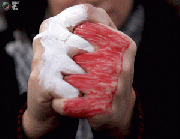Two Bahraini Shi’a activists who were detained after weeks
of anti-government protests have died in police custody.
The interior ministry said Ali Issa Saqer, 31, had died when
guards tried to restrain him for “causing chaos.”
Another detainee, Zakaraya Rashed Hassan, 40, had died of
sickle cell disease, the ministry added. It was the second such death in a
week.
Several Shi’a activists have complained of being tortured
while in custody. The government denies the allegations.
Bahrain imposed emergency rule last month after weeks of
anti-government protests in the tiny Gulf kingdom, where the Sunni monarchy is
accused of discrimination against the Shi’a majority.
The authorities used force to put down the protests, which
have left more than 25 people dead.
Rights groups say the government has since detained more
than 400 people — including human rights activists, doctors, bloggers and
opposition supporters.
The interior ministry said Mr. Saqer was injured while
resisting guards’ attempts to restrain him. He later died in a hospital.
Photos taken before his burial showed criss-cross purple
lash marks all over his back. His legs were also badly bruised, and his toes
and feet were covered in purple bruises.
There was a big bruise on the left side of his head and
possible burn marks on his ankles and wrists, said Daniel Williams, a senior
researcher with Human Rights Watch (HRW), who viewed the body as it was being
prepared for burial.
“This looked much worse than anything I’ve seen,”
Mr. Williams said, referring to other cases in Bahrain of apparent lash marks
seen on the backs of people detained at checkpoints.
Saqer was arrested on March 13 for the attempted murder of a
policeman, the ministry said. The government denies any torture but says all
such accusations will be investigated.
It said the other detainee, Hassan, had been “found
dead” in his cell. A post-mortem said he died of complications from
sickle-cell anemia.
Hassan was detained on April 2 on charges of “inciting
hatred, publishing false news, promoting sectarianism and calling for the overthrow
of the regime” on social networking sites, the interior ministry said.
HRW said both the families of the men who allegedly died of
sickle-cell disease had dismissed the findings.
“It is extremely scary that in all three cases of the
deaths last week, the families only heard about their loved ones when they were
dead,” Mr Williams told the BBC.
HRW has called for an investigation into all suspected cases
of abuse, and stressed that all detainees must be given access to lawyers and
to their families.
Campaign of fear
In the two most recent cases, Bahraini activists say the men
were abused physically and mentally, and may have died as a result.
“We believed they killed them in prison,” said
Nabeel Rajab of the Bahrain Center for Human Rights.
Human Rights
Watch has called for Saqer’s death to be investigated
On Monday, the authorities accused Rajab of publishing
fabricated images on the Internet and summoned him for questioning.
Meanwhile, the former chief editor of Bahrain’s main
opposition newspaper — al-Wasat — said he too had been summoned by a prosecutor
investigating the paper’s allegedly unethical coverage of the uprising.
The latest moves come two days after a leading opposition
figure and rights activist, Abdul Hadi al-Khawaja, was beaten up and arrested
in the capital, Manama.
The unrest started on February 14, when Shi’a protesters —
emboldened by uprisings in Tunisia and Egypt — took to the streets urging
democratic reform. Some called for the overthrow of the monarchy.
Weeks of protests prompted the Sunni-led government to
impose martial law and invite in troops from Sunni-ruled neighbors such as
Saudi Arabia and the United Arab Emirates.
Since then the Bahrain government — a key U.S. ally in the
region — has launched a crackdown against opposition activists, journalists and
doctors.
It accuses Iran of fomenting the unrest — which Tehran denies.






Leave a Reply